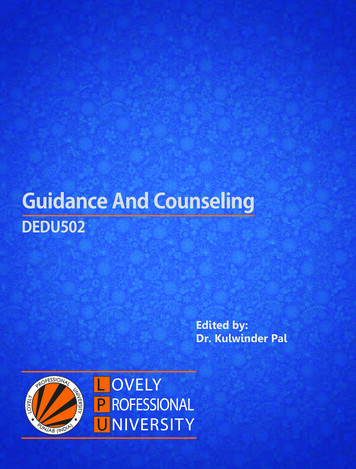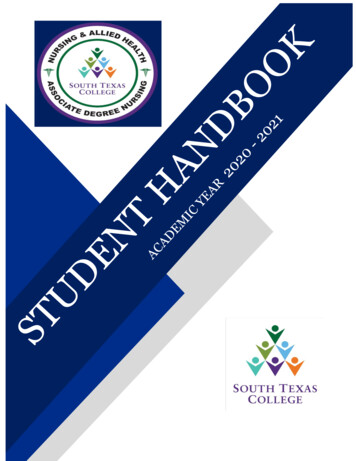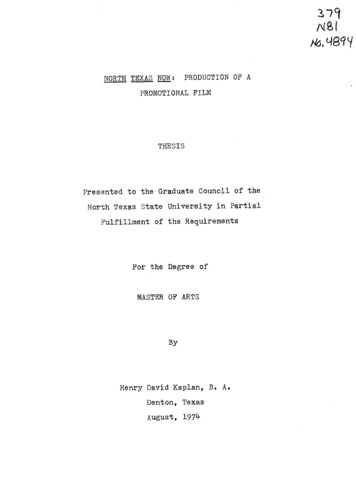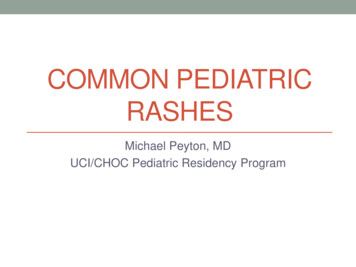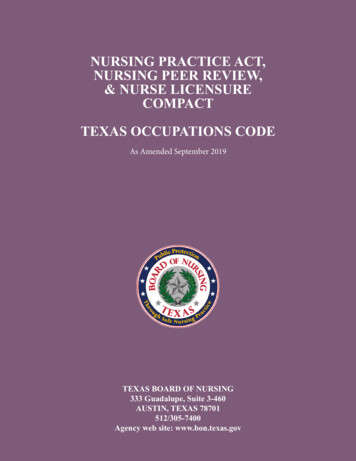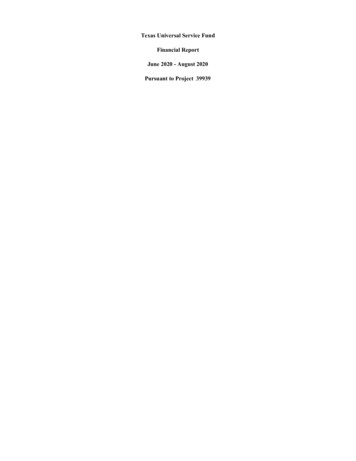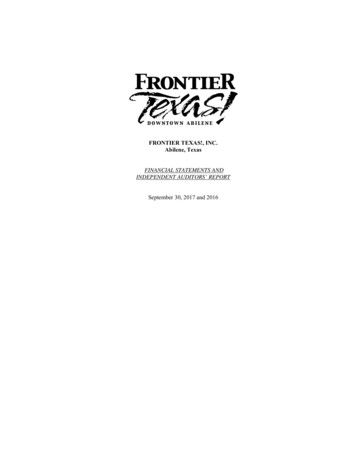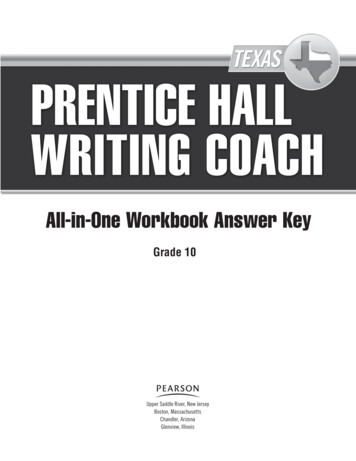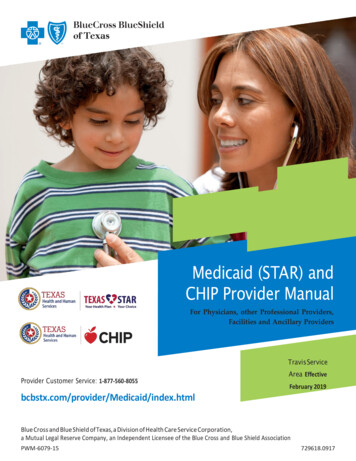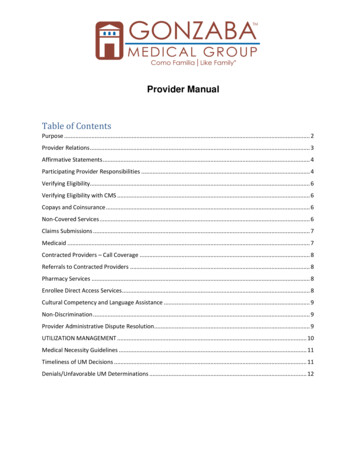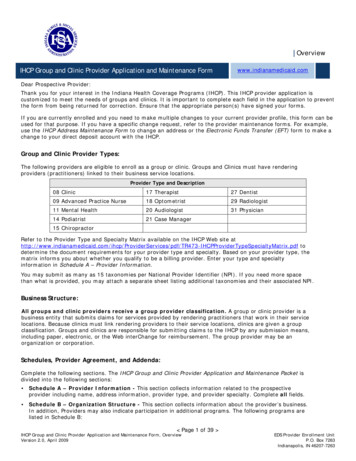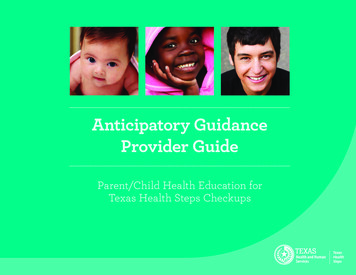
Transcription
Anticipatory GuidanceProvider GuideParent/Child Health Education forTexas Health Steps Checkups
Your Tool for Providing Anticipatory GuidanceThe Anticipatory Guidance Provider Guide is tailored specifically to Texas Health Steps providers for useduring their patients’ periodic medical checkups. It provides age-appropriate anticipatory guidance topics forchildren birth through 20 years of age. These topics are consistent with those included on the Texas HealthSteps Child Health Clinical Record Forms, which are recommended but not required for use by Texas HealthSteps providers.Anticipatory guidance is a federally mandated component of each Texas Health Steps medical and dental checkup. Education andcounseling provided during a medical checkup help the child and parent/guardian understand expected growth and development.Anticipatory guidance also serves to provide information about the benefits of healthy lifestyles and practices, as well as accident anddisease prevention.The flipchart format makes the Anticipatory Guidance Provider Guide easy and convenient to use during checkups. As graphics andtext are designed to be child and family friendly, we encourage you to view it together with the child and parent/guardian as you coverthe topics with them. Topic headings on the child and family side of the flipchart pages use simpler, more common terms and are morepatient-oriented than those on the provider side.Flexibility to Meet the Needs of Patient and Family During the CheckupProviders are not expected to address all of the possible age-appropriate topics during a checkup. The guide is meant to supportclinicians in providing patient education and to enable the patient and family to self-select what to discuss duringthe visit.You are free to adapt the guide to meet their specific needs. We encourage you to individualize and prioritize the topics according to thequestions or concerns they raise.
InfancyBirth - 11 MonthsInfancy
InfancyDischarge to 5-Days CheckupFamily Well-Being§§ Keep a usual family routine.§§ Get ready for return to work/school(if planned).§§ Schedule next postpartum checkup.§§ Be aware of postpartum depression/family stress.§§ Keep child in rear-facing car seat in backseat of car until at least 2 years or untilchild is over the height/weight limit setby seat maker.§§ Ensure home is safe from fire and carbonmonoxide poisoning.§§ Breastfeed 8 - 12 times in 24 hours.§§ Formula-feed every 3 - 4 hours.§§ Do not heat milk in microwave.§§ Expect 6 – 8 wet diapers a day.§§ Note stool color and frequency.§§ Do not smoke in home or car.§§ Keep track of baby’s weight gain.§§ Accept help.§§ Set water heater at less than120 degrees.Regular Care/RoutinesKeeping Baby Safe§§ Avoid hot liquids when holding baby.§§ Do not shake or hit baby.§§ Have baby sleep in crib in roomwith you.§§ Do not share bed with baby.§§ Put baby on back in crib withno loose covers or soft bedding.§§ Use a crib with slats no less than2³/8 inches wide.§§ Choose safe, quality child care.§§ Report family violence.Healthy Feeding§§ Clean skin, umbilical cord, circumcision.§§ Clean mouth with soft cloth2 times a day.§§ Wash hands often.§§ Avoid crowds.§§ Avoid alcohol use while breastfeeding.§§ Take temperature by rectum.§§ Do not put baby in bed with bottle.§§ Follow skin care tips.§§ Hold onto bottle, do not prop it.§§ Hold baby’s head, allow tummy time.§§ Follow breastfeeding “how to” tips.Healthy Progress§§ Do not leave baby alone in bath water.§§ Store breastmilk in freezer.§§ Keep a hand on baby when on bed orchanging on table or couch and never leavealone.§§ Follow label guide for mixing formula.§§ Store mixed formula (for 1-day use only)in refrigerator.§§ Stroke head or rock gently to calm baby.§§ Talk to baby with simple words, readsimple stories.
InfancyDischarge to 5-Days CheckupThese are areas we cover during this checkup:§§ Family Well-Being§§ Keeping Baby Safe§§ Healthy Feeding§§ Regular Care/Routines§§ Healthy ProgressWhat are your main concerns today?
Infancy2-Week CheckupFamily Well-Being§§ Keep a usual family routine.§§ Get ready for return to work/school(if planned).§§ Schedule next postpartum checkup.§§ Be aware of postpartum depression/familystress.§§ Keep child in rear-facing car seat in backseat of car until at least 2 years or untilchild is over the height/weight limit set byseat maker.§§ Ensure home is safe from fire and carbonmonoxide poisoning.§§ Do not smoke in home or car.§§ Accept help.§§ Set water heater at less than120 degrees.Keeping Baby Safe§§ Avoid hot liquids when holding baby.§§ Do not shake or hit baby.§§ Have baby sleep in crib in roomwith you.§§ Do not share bed with baby.§§ Put baby on back in crib with no loosecovers or soft bedding.§§ Use a crib with slats no less than2³/8 inches wide.§§ Choose safe, quality child care.§§ Report family violence.Healthy Feeding§§ Do not heat milk in microwave.§§ Expect 6 – 8 wet diapers a day.§§ Note stool color and frequency.§§ Keep track of baby’s weight gain.Regular Care/Routines§§ Clean mouth with soft cloth2 times a day.§§ Clean skin, umbilical cord, circumcision.§§ Take temperature by rectum.§§ Follow skin care tips.§§ Wash hands often.§§ Avoid crowds.§§ Avoid alcohol use while breastfeeding.§§ Hold baby’s head, allow tummy time.§§ Do not put baby in bed with bottle.Healthy Progress§§ Hold onto bottle, do not prop it.§§ Follow breastfeeding “how to” tips.§§ Do not leave baby alone in bath water.§§ Store breastmilk in freezer.§§ Keep a hand on baby when on bed orchanging on table or couch and neverleave alone.§§ Follow label guide for mixing formula.§§ Store mixed formula (for 1-day use only) inrefrigerator.§§ Breastfeed 8 - 12 times in 24 hours.§§ Formula-feed every 3 - 4 hours.§§ Stroke head or rock gently to calm baby.§§ Talk to baby with simple words, readsimple stories.
Infancy2-Week CheckupThese are areas we cover during this checkup:§§ Family Well-Being§§ Keeping Baby Safe§§ Healthy Feeding§§ Regular Care/Routines§§ Healthy ProgressWhat are your main concerns today?
Infancy2-Month CheckupFamily Well-Being§§ Keep a usual family routine.§§ Get ready for return to work/school(if planned).§§ Schedule next postpartum checkup.§§ Keep child in rear-facing car seat in backseat of car until at least 2 years or untilchild is over the height/weight limit set byseat maker.§§ Breastfeed 8 - 12 times in 24 hours.§§ Ensure home is safe from fire, carbonmonoxide poisoning, and choking hazards.Regular Care/Routines§§ Formula-feed every 3 - 4 hours.§§ Do not heat milk in microwave.§§ Do not smoke in home or car.§§ Clean mouth with soft cloth2 times a day.§§ Accept help.§§ Set water heater at less than120 degrees.§§ Clean skin daily.Keeping Baby Safe§§ Avoid hot liquids when holding baby.§§ Be aware of postpartum depression/familystress.§§ Do not shake or hit baby.§§ Have baby sleep in crib in roomwith you.§§ Do not share bed with baby.§§ Put baby on back in crib with no loosecovers or soft bedding.§§ Use a crib with slats no less than2³/8 inches wide.§§ Choose safe, quality child care.§§ Report family violence.§§ Take temperature by rectum.§§ Follow skin care tips.§§ Wash hands often.§§ Avoid crowds.Healthy Feeding§§ Hold baby’s head, allow tummy time.§§ Avoid alcohol use while breastfeeding.Healthy Progress§§ Do not put baby in bed with bottle.§§ Hold onto bottle, do not prop it.§§ Follow breastfeeding “how to” tips.§§ Talk to baby often using simple wordsto promote language.§§ Do not place baby in a walker.§§ Store breastmilk in freezer.§§ Talk to baby with simple words, readsimple stories.§§ Do not leave baby alone in bath water.§§ Follow label guide for mixing formula.§§ Sing simple songs to baby.§§ Keep a hand on baby when on bed orchanging on table or couch and neverleave alone.§§ Store mixed formula (for 1-day use only) inrefrigerator.
Infancy2-Month CheckupThese are areas we cover during this checkup:§§ Family Well-Being§§ Keeping Baby Safe§§ Healthy Feeding§§ Regular Care/Routines§§ Healthy ProgressWhat are your main concerns today?
Infancy4-Month CheckupFamily Well-Being§§ Keep a usual family routine.Keeping Baby Safe§§ Do not smoke in home or car.§§ Set water heater at less than120 degrees.Regular Care/Routines§§ Clean mouth with soft cloth2 times a day.§§ Avoid hot liquids when holding baby.§§ Do not shake or hit baby.§§ Hold baby’s head, allow tummy time.§§ Choose safe, quality child care.§§ Do not share bed with baby.§§ Soothe baby if teething begins.§§ Report family violence.§§ Put baby on back in crib with no loosecovers or soft bedding.§§ Assess home risk for exposure to lead.§§ Use a crib with slats no less than2³/8 inches wide.§§ Lock up guns.Healthy Feeding§§ Do not leave baby alone in bath water.§§ Avoid alcohol use while breastfeeding.§§ Keep a hand on baby when on bed orchanging on table or couch and neverleave alone.§§ Do not put baby in bed with bottle.§§ Keep child in rear-facing car seat in backseat of car until at least 2 years or untilchild is over the height/weight limit set byseat maker.§§ Ensure home is safe from fire, carbonmonoxide poisoning, and choking hazards.§§ Hold onto bottle, do not prop it.§§ Store breastmilk in freezer.§§ Follow label guide for mixing formula.§§ Store mixed formula (for 1-day use only) inrefrigerator.§§ Breastfeed 8 - 12 times in 24 hours.§§ Do not heat milk in microwave.§§ Introduce solids slowly, one at a time.Healthy Progress§§ Talk to baby often using simple wordsto promote language.§§ Read picture books and tellsimple stories.§§ Sing simple songs to baby.§§ Give baby age-appropriate toyswith no small pieces.
Infancy4-Month CheckupThese are areas we cover during this checkup:§§ Family Well-Being§§ Keeping Baby Safe§§ Healthy Feeding§§ Regular Care/Routines§§ Healthy ProgressWhat are your main concerns today?
Infancy6-Month CheckupFamily Well-Being§§ Keep a usual family routine.Keeping Baby Safe§§ Do not shake or hit baby.§§ Put baby on back in crib with no loosecovers or soft bedding.§§ Choose safe, quality child care.§§ Report family violence.§§ Assess home risk for exposure to lead.§§ Lock up guns.Healthy Feeding§§ Avoid alcohol use while breastfeeding.§§ Use a crib with slats no less than2³/8 inches wide.§§ Do not use infant feeders.§§ Do not place baby in a walker.§§ Do not put baby in bed with bottle.§§ Do not leave baby alone in bath water.§§ Keep a hand on baby when on bed orchanging on table or couch and neverleave alone.§§ Keep child in rear-facing car seat in backseat of car until at least 2 years or untilchild is over the height/weight limit set byseat maker.§§ Ensure home is safe from fire, carbonmonoxide poisoning, and choking hazards.§§ Set water heater at less than120 degrees.§§ Do not force baby to eat or finish food.§§ Store breastmilk in freezer.§§ Follow label guide for mixing formula.§§ Store mixed formula (for 1-day use only) inrefrigerator.§§ Breastfeed 8 - 12 times in 24 hours.§§ Do not heat milk in microwave.§§ Introduce solids slowly, one at a time.§§ Mash up table foods before giving them tobaby.§§ Cut table foods into small pieces;do not offer hot dogs cut into circles.§§ Offer baby water or juice in a cup atsnack time.Regular Care/Routines§§ Clean mouth and teeth with soft cloth/toothbrush 2 times a day.§§ Establish ongoing care with dentalprovider.§§ Soothe baby when teething.Healthy Progress§§ Talk to baby often using simple wordsto promote language.§§ Read picture books and tellsimple stories.§§ Sing simple songs to baby.§§ Give baby age-appropriate toyswith no small pieces.§§ Use distraction for discipline.
Infancy6-Month CheckupThese are areas we cover during this checkup:§§ Family Well-Being§§ Keeping Baby Safe§§ Healthy Feeding§§ Regular Care/Routines§§ Healthy ProgressWhat are your main concerns today?
Infancy9-Month CheckupFamily Well-BeingHealthy FeedingHealthy Progress§§ Keep a usual family routine.§§ Do not put baby in bed with bottle.§§ Make one-on-one time for each childin family.§§ Do not use infant feeders.§§ Limit TV/screen time to 1-2 hoursa day.§§ Do not force baby to eat or finish food.§§ Praise good behavior.Keeping Baby Safe§§ Introduce a cup to begin the weaningprocess.§§ Promote language using simple words.§§ Provide age-appropriate toys.§§ Offer water or juice at snack time.§§ Provide favorite toy for self-soothingduring sleep time.§§ Do not shake or hit baby.§§ Do not leave baby alone in bath water.§§ Empty all buckets of water.§§ Keep child in rear-facing car seat in backseat of car until at least 2 years or untilchild is over the height/weight limit set byseat maker.§§ Choose safe, quality child care.§§ Assess home risk for exposure to lead.§§ Slowly increase the choice of solid foods.§§ Cut table foods into small pieces; do notoffer hot dogs cut into circles.Regular Care/Routines§§ Clean teeth with soft toothbrush2 times a day.§§ Lock up guns.§§ Establish ongoing care with dentalprovider.§§ Cover electrical outlets.§§ Establish a consistent bedtime routine.§§ Keep cleaning supplies and medicine awayfrom baby.§§ Provide nap time daily.§§ Read books and talk about pictures/storyusing simple words.§§ Provide reassurance to reduce separationanxiety.§§ Use distraction or choice of 2 appropriateoptions for discipline.
Infancy9-Month CheckupThese are areas we cover during this checkup:§§ Family Well-Being§§ Keeping Baby Safe§§ Healthy Feeding§§ Regular Care/Routines§§ Healthy ProgressWhat are your main concerns today?
Early Childhood1 - 4 YearsEarly Childhood
Early Childhood12-Month CheckupFamily Well-Being§§ Lock up guns.Healthy Progress§§ Keep a usual family routine.§§ Cover electrical outlets.§§ Make one-on-one time for each childin family.§§ Keep cleaning supplies and medicine awayfrom baby.§§ Encourage supervised outdoor play.Keeping Child SafeHealthy Feeding§§ Promote language using simple words.§§ Limit TV/screen time to 1-2 hours a day.§§ Praise good behavior.§§ Do not shake or hit baby.§§ Do not put baby in bed with bottle.§§ Provide age-appropriate toys.§§ Keep child in rear-facing car seat in backseat of car until at least 2 years or untilchild is over the height/weight limit setby seat maker.§§ Begin weaning from breast or bottle;offer only water in bottle.§§ Provide favorite toy for self-soothingduring sleep time.§§ Provide 3 nutritious meals and2 snacks a day.§§ Read books and talk about pictures/storyusing simple words.§§ Choose safe, quality child care.§§ Limit sweets and high-fat foods.§§ Do not leave alone in bath water.§§ Provide spoon for eating and cupfor drinking.§§ Use distraction or choice of2 appropriate options to avoid/resolve conflicts.§§ Stay within an arm’s length when baby isnear water.§§ Empty all buckets of water.§§ Ensure home is safe from fire and carbonmonoxide poisoning.§§ Assess home risk for exposure to lead.Regular Care/Routines§§ Clean teeth with soft toothbrush2 times a day.§§ Establish ongoing care with dentalprovider.§§ Establish a consistent bedtime routine.§§ Use time-out of 1 minute per yearof age for discipline.
Early Childhood12-Month CheckupThese are areas we cover during this checkup:§§ Family Well-Being§§ Keeping Child Safe§§ Healthy Feeding§§ Regular Care/Routines§§ Healthy DevelopmentWhat are your main concerns today?
Early Childhood15-Month CheckupFamily Well-Being§§ Install stair gates and window guards.§§ Encourage supervised outdoor play.§§ Keep a usual family routine.§§ Lock up guns.§§ Promote language with simple words.§§ Make one-on-one time for eachchild in family.§§ Cover electrical outlets.§§ Provide age-appropriate toys.Keeping Child SafeHealthy Feeding§§ Do not put child in bed with bottle.§§ Provide reassurance to reduce separationanxiety.§§ Do not shake or hit child.§§ Choose safe, quality child care.§§ Keep child in rear-facing car seat in backseat of car until at least 2 years or untilchild is over the height/weight limit set byseat maker.§§ Do not leave alone in bath water.§§ Stay within arm’s length when child isnear water.§§ Assess home risk for exposure to lead.§§ Ensure home is safe from fire, carbonmonoxide poisoning, and choking hazards.§§ Keep cleaning supplies and medicinesaway from child.§§ Provide 3 nutritious meals and2 snacks a day.§§ Offer favorite toy for self-soothing duringsleep time.§§ Limit sweets and high-fat foods.§§ Use distraction or choice of 2 appropriateoptions to avoid/resolve conflicts.Regular Care/Routines§§ Read books and talk about pictures/storyusing simple words.§§ Clean teeth with soft toothbrush2 times a day.§§ Establish a consistent bedtime routine.Healthy Development§§ Establish consistent limits, rules,and consequences.§§ Praise good behavior.§§ Limit TV/screen time to 1-2 hoursa day.§§ Discipline constructively using time-outfor 1 minute per year of age.
Early Childhood15-Month CheckupThese are areas we cover during this checkup:§§ Family Well-Being§§ Keeping Child Safe§§ Healthy Feeding§§ Regular Care/Routines§§ Healthy DevelopmentWhat are your main concerns today?
Early Childhood18-Month CheckupFamily Well-Being§§ Keep a usual family routine.§§ Make one-on-one time for each childin family.§§ Be aware of language used because childwill imitate.§§ Ensure home is safe from fire, carbonmonoxide poisoning, and choking hazards.§§ Keep cleaning supplies and medicinesaway from child.§§ Install stair gates and window guards.§§ Lock up guns.§§ Watch for sibling rivalry.§§ Cover electrical outlets.Keeping Child SafeHealthy Feeding§§ Do not shake or hit child.§§ Choose safe, quality child care.§§ Keep child in rear-facing car seat in backseat of car until at least 2 years or untilchild is over the height/weight limit set byseat maker.§§ Do not leave alone in bath water.§§ Stay within arm’s length when child isnear water.§§ Assess home risk for exposure to lead.§§ Keep Poison Control number handy:1-(800)-222-1222.§§ Provide 3 nutritious meals and2 snacks a day.Healthy Development§§ Establish consistent limits, rules,and consequences.§§ Praise good behavior.§§ Help child describe feelings insimple words.§§ Limit TV/screen time to 1-2 hoursa day.§§ Provide age-appropriate toys to developimagination and self-expression.§§ Limit sweets and high-fat foods.§§ Offer favorite toy for self-soothing duringsleep time.Regular Care/Routines§§ Use distraction or choice of 2 appropriateoptions to avoid/resolve conflicts.§§ Assist with brushing teeth with softtoothbrush 2 times a day.§§ Establish ongoing care with dentalprovider.§§ Establish a consistent bedtime routine.§§ Encourage supervised outdoor play.§§ Begin toilet training when ready.§§ Read books and talk about pictures/storyusing simple words.§§ Discipline constructively using time-outfor 1 minute per year of age.
Early Childhood18-Month CheckupThese are areas we cover during this checkup:§§ Family Well-Being§§ Keeping Child Safe§§ Healthy Feeding§§ Regular Care/Routines§§ Healthy DevelopmentWhat are your main concerns today?
Early Childhood24-Month CheckupFamily Well-Being§§ Keep a usual family routine.§§ Make one-on-one time for each childin family.§§ Be aware of language used because childwill imitate.Keeping Child Safe§§ Do not shake or hit child.§§ Choose safe, quality child care.§§ Keep child in rear-facing car seat in backseat of car until at least 2 years or untilchild is over the height/weight limit set byseat maker.§§ Do not leave alone in bath water.§§ Stay within arm’s length when child isnear water.§§ Ensure home is safe from fire, carbonmonoxide poisoning, and choking hazards.§§ Keep Poison Control number handy:1-(800)-222-1222.§§ Keep cleaning supplies and medicinesaway from child.Healthy Development§§ Lock up guns.§§ Establish consistent limits, rules,and consequences.§§ Require helmet when child rides tricycleor bicycle.§§ Praise good behavior.Healthy Feeding§§ Provide 3 nutritious meals and2 snacks a day.§§ Limit sweets and high-fat foods.Regular Care/Routines§§ Assist with brushing teeth with softtoothbrush 2 times a day.§§ Establish ongoing care with dentalprovider.§§ Establish a consistent bedtime routine.§§ Encourage supervised outdoor play.§§ Teach child how to properly wash hands;encourage washing before meals and aftertoilet training.§§ Continue with toilet training by providingfrequent potty breaksevery 2 hours.§§ Help child describe feelings in simplewords.§§ Limit TV/screen time to 1-2 hoursa day.§§ Provide age-appropriate toys to developimagination and self-expression.§§ Read books and talk about pictures/storyusing simple words.§§ Provide opportunities for side-by-side playwith others of same age group.§§ Be aware of child saying “No” for selfopinion, frustration, and anger.§§ Discipline constructively using time-outfor 1 minute per year of age.
Early Childhood24-Month CheckupThese are areas we cover during this checkup:§§ Family Well-Being§§ Keeping Child Safe§§ Healthy Feeding§§ Regular Care/Routines§§ Healthy DevelopmentWhat are your main concerns today?
Early Childhood30-Month CheckupFamily Well-Being§§ Keep a usual family routine.§§ Make one-on-one time for each childin family.§§ Assess home for lead exposure.§§ Keep cleaning supplies and medicinesaway from child.§§ Lock up guns.§§ Be aware of language used because childwill imitate.§§ Teach child to properly answerthe telephone.Keeping Child Safe§§ Require helmet when child rides tricycleor bicycle.§§ Do not shake or hit child.§§ Choose safe, quality child care.§§ Keep child in front-facing car seat withharness in back seat until the child meetsthe height and weight limit set by seatmaker.§§ Supervise when child is near water, even ifchild knows how to swim.§§ Ensure home is safe from fire, carbonmonoxide poisoning, and choking hazards.§§ Keep Poison Control number handy:1-(800)-222-1222.Healthy Feeding§§ Provide 3 nutritious meals and2 snacks a day.Healthy Development§§ Establish consistent limits, rules,and consequences.§§ Limit TV/screen time to 1-2 hoursa day.§§ Allow child to begin dressing selfwith t-shirt.§§ Provide age-appropriate toys to developimagination and self-expression.§§ Read books and talk about pictures/storyusing simple words.§§ Limit sweets and high-fat foods.§§ Provide opportunities for side-by-side playwith others of same age group.Regular Care/Routines§§ Be aware of child saying “No” for selfopinion, frustration, and anger.§§ Assist with brushing teeth with softtoothbrush 2 times a day.§§ Establish ongoing care with dentalprovider.§§ Establish a consistent bedtime routine.§§ Encourage supervised outdoor play.§§ Discipline constructively using time-outfor 1 minute per year of age.
Early Childhood30-Month CheckupThese are areas we cover during this checkup:§§ Family Well-Being§§ Keeping Child Safe§§ Healthy Feeding§§ Regular Care/Routines§§ Healthy DevelopmentWhat are your main concerns today?
Early Childhood3-Year CheckupFamily Well-Being§§ Assess home for lead exposure.§§ Keep a usual family routine.§§ Lock up guns.§§ Make one-on-one time for each childin family.§§ Teach child to answer the door andtelephone.§§ Make time for yourself and your partner.§§ Require helmet when child ridestricycle or bicycle.Keeping Child Safe§§ Do not shake or hit child.§§ Choose safe, quality child care.§§ Keep child in front-facing car seat withharness in back seat until the child meetsthe height and weight limit set by seatmaker.§§ Supervise when child is in or near water,even if child knows how to swim.§§ Ensure home is safe from fire, carbonmonoxide poisoning, and choking hazards.§§ Keep Poison Control number handy:1-(800)-222-1222.Healthy Feeding§§ Provide 3 nutritious meals and2 snacks a day.Healthy Development§§ Establish consistent limits, rules, andconsequences.§§ Encourage child to tell the story hisor her way.§§ Limit TV/screen time to 1-2 hoursa day.§§ Show affection and praise for goodbehaviors.§§ Limit sweets and high-fat foods.§§ Provide age-appropriate toys to developimagination.Regular Care/Routines§§ Read books and sing together daily.§§ Assist with brushing teeth with softtoothbrush 2 times a day.§§ Establish ongoing care with dentalprovider.§§ Establish a consistent bedtime routine.§§ Encourage supervised outdoor play.§§ Discipline constructively using time-outfor 1 minute per year of age.
Early Childhood3-Year CheckupThese are areas we cover during this checkup:§§ Family Well-Being§§ Keeping Child Safe§§ Healthy Feeding§§ Regular Care/Routines§§ Healthy DevelopmentWhat are your main concerns today?
Early Childhood4-Year CheckupFamily Well-Being§§ Keep a usual family routine.§§ Make one-on-one time for each childin family.§§ Advocate with preschool teacherfor child facing school difficultiesor bullying.Keeping Child Safe§§ Do not shake or hit child.§§ Choose safe, quality after-school care.§§ Keep child in front-facing car seat withharness in back seat until the child meetsthe height and weight limit set by seatmaker.§§ Supervise when child is in or near water,even if child knows how to swim.§§ Ensure home is safe from fire and carbonmonoxide poisoning hazards.§§ Develop family plan for exiting housein a fire and establish meeting place afterexit.§§ Assess home for lead exposure.§§ Lock up guns.§§ Teach child home address, telephonenumbers, and names of parents/guardians.§§ Teach child how to answer the door andtelephone.§§ Teach self-safety for personal privacy.§§ Teach street safety: do not run after balls,do not cross street alone.§§ Require helmet when child rides tricycleor bicycle.Healthy Feeding§§ Provide 3 nutritious meals and2 snacks a day.Healthy Development§§ Establish consistent limits, rules, andconsequences.§§ Establish daily chores to develop sense ofaccomplishment and self-confidence.§§ Encourage child to tell the story his or herway.§§ Limit TV/screen time to 1-2 hoursa day.§§ Show affection and praise for goodbehaviors.§§ Encourage constructive conflict resolutionand demonstrate at home.§§ Limit sweets and high-fat foods.§§ Encourage self-dressing and allow tochoose own clothing sometimes.Regular Care/Routines§§ Read a story and discuss books daily.§§ Assist with brushing teeth with softtoothbrush 2 times a day.§§ Establish a consistent bedtime routine.§§ Encourage supervised outdoor play.
Early Childhood4-Year CheckupThese are areas we cover during this checkup:§§ Family Well-Being§§ Keeping Child Safe§§ Healthy Feeding§§ Regular Care/Routines§§ Healthy DevelopmentWhat are your main concerns today?
Middle Childhood5 - 10 YearsMiddle Childhood
Middle Childhood5-Year CheckupFamily Well-Being§§ Keep a usual family routine.§§ Advocate with teacher for child facingschool difficulties or bullying.Keeping Child Safe§§ Choose safe, quality after-school care.§§ Keep child in front-facing car seat withharness in back seat until the child meetsthe height and weight limit setby seat maker.§§ Supervise when child is in or near water,even if child knows how to swim.§§ Ensure home is safe from fire and carbonmonoxide poisoning hazards.§§ Develop family plan for exiting housein a fire and establish meeting placeafter exit.§§ Assess home for lead exposure.§§ Lock up guns.§§ Teach child how to answer the doorand telephone.§§ Teach self-safety including stranger dangerand personal privacy.§§ Teach street safety: do not run after balls,do not cross street alone.§§ Require protective gear be wornat all times during sports.§§ Require helmet when child uses bicycle,skates, or other mobility equipment.Healthy Eating§§ Provide 3 nutritious meals and2 snacks a day.§§ Limit sweets and high-fat foods.§§ Emphasize importance of breakfast.§§ Provide 5 servings of fruits and vegetablesdaily.§§ Limit juice and ensure adequate calcium.Regular Care/Routines§§ Assist with brushing teeth with softtoothbrush 2 times a day; floss daily.§§ Establish a consistent bedtime routine.§§ Encourage supervised outdoor play for 1hour a day.Healthy Development§§ Establish consistent limits, rules, andconsequences.§§ Establish daily chores to develop sense ofaccomplishment and self-confidence.§§ Encourage child to tell the story his orher way.§§ Limit TV/screen time to 1-2 hoursa day.§§ Show affection and praise for goodbehaviors.§§ Encourage constructive conflict resolutionand demonstrate at home.§§ Read a story and discuss books daily.§§ Discuss school activities daily.
Middle Childhood5-Year CheckupThese are areas we cover during this checkup:§§ Family Well-Being§§ Keeping Child Safe§§ Healthy Eating§§ Regular Care/Routines§§ Healthy DevelopmentWhat are your main concerns today?
Middle Childhood6-Year CheckupFamily Well-Being§§ Keep a usual family routine.§§ Advocate with teacher for child facingschool difficulties or bullying.§§ Teach child how to answer the door andtelephone.§§ Teach self-safety including strangerdanger and personal privacy.§§ Choose safe, quality after-school care.§§ Teach safety rules for running after balls,crossing street, riding bicycle,and boarding bus.§§ Place child in a belt-positioning boosterseat in back seat of car only if child hasoutgrown the height and weight limit offorward-facing car seat with harness.§§ Require protective gear be worn at alltimes during sports.§§ Require helmet when child uses bicycle,skates, or other mobility equipment.§§ Supervise when child is in or near water,even if child knows how to swim.Healthy EatingKeeping Child Safe§§ Ensure home is safe from fire and carbonmonoxide poisoning hazards.§§ Develop family plan for exiting housein a fire and establish meeting place afterexit.§§ Provide 3 nutritious meals and2 snacks a day.§§ Limit sweets and high-fat foods.§§ Emphasize the importance of breakfast.§§ Assess home for lead exposure.§§ Provide 5 servings of fruits and vegetablesdaily.§§ Lock up guns.§§ Limit juice and ensure adequate calcium.Regular Care/Routines§§ Assist with brushing teeth with softtoothbrush 2 times a day; floss daily.§§ Establish ongoing care with dentalprovider.§§ Establish a consistent bedtime routine.§§ Enco
Steps Child Health Clinical Record Forms, which are recommended but not required for use by Texas Health Steps providers. Anticipatory guidance is a federally mandated component of each Texas Health S
